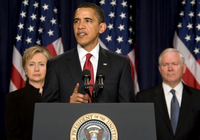As a candidate, Barack Obama promised to withdraw from Iraq, "finish the fight against al-Qaida and the Taliban," shut down Gitmo and break through the impasse with Iran. But as president, Obama is learning that conducting U.S. foreign policy is far more difficult than simply critiquing it. As a consequence, on the central foreign policy and national security issue of the day -- the global struggle against Islamic terrorists and their patrons and partners -- there is far more common ground between Obama and former President George W. Bush than Obama's supporters expected, and less change than his opponents feared.
To be sure, this emerging continuity is overshadowed by Obama's rhetoric, sprinkled with references to "the failed policies of the previous administration." And there have been real divergences in other areas of foreign policy, including Russian relations, missile defense and Israel-Palestine. But in the fight against Islamic terrorists, actions speak louder than words.
Consider the Obama administration's policies in Yemen and the Afghanistan-Pakistan theater. Obama will never admit it, but on these two fronts, he is carrying out a key element of the Bush Doctrine -- namely, that the U.S. will target the places where terrorists find refuge and support any governments that are too weak to wage the battle alone.

